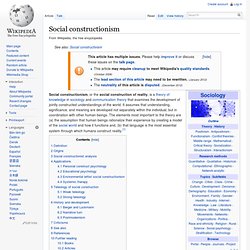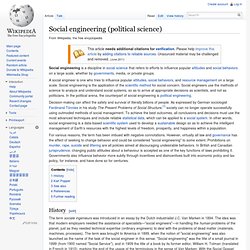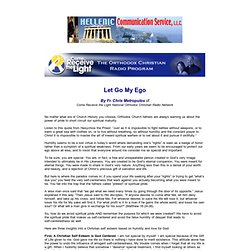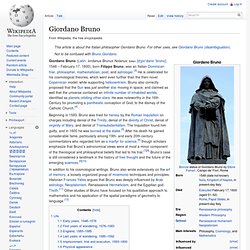

Social constructionism. Social constructionism, or the social construction of reality, is a theory of knowledge in sociology and communication theory that examines the development of jointly constructed understandings of the world.

It assumes that understanding, significance, and meaning are developed not separately within the individual, but in coordination with other human beings. The elements most important to the theory are (a) the assumption that human beings rationalize their experience by creating a model of the social world and how it functions and, (b) that language is the most essential system through which humans construct reality.[1] Definition[edit] Social constructs are the by-products of countless human choices, rather than laws resulting from human judgment. Social constructionism is not the result of anti-determinism, though. Ian Hacking noted in The Social Construction of What?
Origins[edit] Social constructionist analysis[edit] "Social construction" may mean many things to many people. John R. Social engineering (political science) Decision-making can affect the safety and survival of literally billions of people.

As expressed by German sociologist Ferdinand Tönnies in his study The Present Problems of Social Structure,[1] society can no longer operate successfully using outmoded methods of social management. To achieve the best outcomes, all conclusions and decisions must use the most advanced techniques and include reliable statistical data, which can be applied to a social system. In other words, social engineering is a data-based scientific system used to develop a sustainable design so as to achieve the intelligent management of Earth’s resources with the highest levels of freedom, prosperity, and happiness within a population.
For various reasons, the term has been imbued with negative connotations. However, virtually all law and governance has the effect of seeking to change behavior and could be considered "social engineering" to some extent. Popper wrote: By Fr. Chris Metropulos of Come Receive the Light National Orthodox Christian Radio Network. No matter what era of Church History you choose, Orthodox Church fathers are always warning us about the power of pride to short circuit our spiritual maturity.

Listen to this quote from Hesychios the Priest: “Just as it is impossible to fight battles without weapons, or to swim a great sea with clothes on, or to live without breathing, so without humility and the constant prayer to Christ it is impossible to master the art of inward spiritual warfare or to set about it and pursue it skillfully.” Humility seems to be a lost virtue in today’s world where demanding one’s “rights” is seen as a badge of honor rather than a symptom of a spiritual weakness. From our early years we seem to be encouraged to protect our ego above all else, and to insist that everyone around me consider me as special and important. To be sure, you are special.
You are, in fact, a free and unrepeatable person created in God’s very Image intended to ultimately be in His Likeness. Until next week. P.S. Giordano Bruno. Giordano Bruno (Latin: Iordanus Brunus Nolanus; Italian: [dʒorˈdano ˈbruno]; 1548 – February 17, 1600), born Filippo Bruno, was an Italian Dominican friar, philosopher, mathematician, poet, and astrologer.[3] He is celebrated for his cosmological theories, which went even further than the then-novel Copernican model: while supporting heliocentrism, Bruno also correctly proposed that the Sun was just another star moving in space, and claimed as well that the universe contained an infinite number of inhabited worlds, identified as planets orbiting other stars.

He was noteworthy in the 16th Century for promoting a pantheistic conception of God, to the dismay of the Catholic Church.[4] In addition to his cosmological writings, Bruno also wrote extensively on the art of memory, a loosely organized group of mnemonic techniques and principles. Life[edit] Early years, 1548–1576[edit] First years of wandering, 1576–1583[edit] In 1579 he arrived in Geneva. England, 1583–1585[edit]